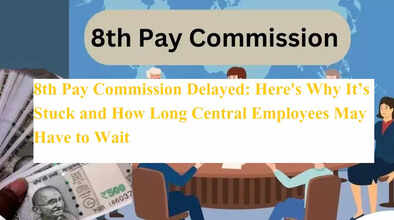8th Pay Commission Delayed: Here's Why It’s Stuck and How Long Central Employees May Have to Wait

More than 35 lakh central government employees and over 67 lakh pensioners have been eagerly awaiting news about the 8th Pay Commission. While the government has formally approved the idea of forming the commission, there’s been no concrete update or official notification since that initial announcement. As the wait grows longer, questions around its implementation timeline, salary revision, and terms of reference continue to surface.
Approval Given, But Formation Still Pending
The buzz around the 8th Pay Commission started gaining momentum when the government gave its in-principle approval. Discussions about the fitment factor and expected salary hikes followed immediately. However, even months later, there is no official statement regarding the actual formation of the commission or its working scope.
This has led to growing uncertainty among government employees and pensioners, who are now questioning whether they’ll need to wait a few more years for any actual benefit.
Employee Unions Demand Action
Various employee unions have been pressing the government to form the commission without delay. Their concern is valid: once the commission is formed, it still has to draft its report, get approvals, and ensure smooth implementation, all of which are time-consuming processes.
Without timely formation, there’s a risk that the pay revision might miss its ideal implementation window.
What the 7th Pay Commission Timeline Suggests
Looking back, the 7th Pay Commission was announced in February 2014 and came into effect from January 2016—a two-year window that allowed ample time for recommendations, approvals, and execution.
In contrast, the announcement for the 8th Pay Commission came in January 2025, and now it's already June 2025, with no formation or even basic Terms of Reference (ToR) defined. The ToR is crucial as it outlines the commission’s objectives, scope, and areas of assessment.
How Much More Delay is Expected?
As per an Economic Times report, internal discussions are ongoing, but the pace of execution appears slow. If the government manages to constitute the commission by the end of 2025, historical patterns suggest that it may take 18 to 24 months to finalize and implement the recommendations.
This means employees may not see a revised salary structure until late 2026 or even early 2027.
Financial Pressure a Key Factor
One major reason behind the delay appears to be the economic burden the pay hike could impose. The government is already juggling welfare schemes, fiscal deficit control, and election promises. A significant increase in salaries could lead to heavy pressure on the national budget, making policymakers cautious in their approach.
Fitment Factor in Focus
The fitment factor plays a vital role in salary revision. It acts as a multiplier to determine the new basic salary. In the 7th Pay Commission, the fitment factor was 2.57, which raised the minimum basic salary from ₹7,000 to ₹18,000.
Experts predict that for the 8th Pay Commission, this factor could range between 2.5 to 2.86, potentially leading to a substantial salary increase, but only once implemented.
Conclusion: Wait Isn’t Over Yet
Though the intent to form the 8th Pay Commission is clear, execution remains pending. With no timeline officially declared and economic constraints at play, central government employees and pensioners may need to be patient until at least 2026-end.
Until then, all eyes remain on the government's next move—and how soon it will turn intent into action.

